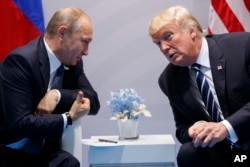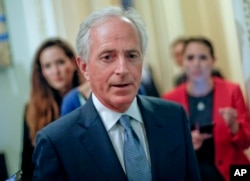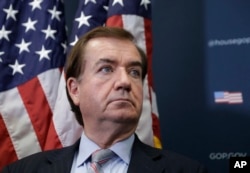Russia's foreign ministry said Friday it is imposing counter measures on the U.S. in response to new sanctions approved Thursday by Congress. The ministry said the sanctions confirm the “extreme aggression of U.S. in international affairs.”
“We propose to the U.S. side,” the ministry said in a statement posted to its website, “to bring the number of diplomatic and technical staff working in the U.S. embassy in Moscow and the consulates general . . . in exact accordance with the number of Russian diplomats and technical staff in the U.S.”
Russia said the reduction in force would bring the number of U.S. diplomats and staff to 455, and would need to be completed by the end of August.
In addition to the reduction in U.S. diplomatic personnel, Russia also said it would block the U.S. embassy in Russia from accessing its warehouses in Moscow and a vacation compound in Serebryany Bor.
“We also reserve the right to take other measures according to the principle of reciprocity, which may affect the interests of the United States,” the ministry said.
A State Department official said on background Friday, “We have received the Russian government notification. Ambassador (John F.) Tefft expressed his strong disappointment and protest.”
Russian diplomats expelled in 2016
The Russian response comes a day after President Vladimir Putin warned that a Russian response was imminent, but suggested he would wait until seeing the final language of the sanctions bill before taking retaliatory measures.
Yet Putin's spokesman, Dmitry Peskov, assured that the Russian leader had personally approved today's Foreign Ministry decision.
“The form in which the sanctions bill emerged from the Senate had greater significance,” said Peskov, in describing the Russian leader's thinking.
The Russian retaliation was celebrated in Moscow as a long overdue response to actions from the previous U.S. administration.
Back in December of 2016, former President Barack Obama expelled 35 Russian diplomats and seized Russian embassy compounds in Maryland and New York as punishment for alleged Russian meddling in the US presidential elections.
Putin waited to make move
At the time, Russian President Putin chose not to respond a move many saw as a gesture of goodwill to the incoming Trump White House, which had expressed a desire for improved relations with Moscow.
Yet today's move reflected growing Russian frustration that the Trump White House besieged by multiple investigations into its ties to Russia during the campaign had not delivered on its campaign promises.
“We did everything in our power to save relations from disaster, but the Americans did just the opposite,” wrote Russian politician Konstantin Kosachev in a post to Facebook. Kosachev went on to call today's retaliation “long overdue.”
Sergey Markov, a political analyst close to the Kremlin, also cheered the Kremlin's decision as inevitable, writing on Facebook that “hope that the President of the United States could change relations with Russia for the better are over.”
U.S. lawmakers approved a bill Thursday imposing new sanctions on not only Russia, but also Iran and North Korea.
Senators overwhelmingly approved the bill with a vote of 98-2, a day after the House and Senate agreed on the terms.
Deal announced late Wednesday
Republican Sen. Bob Corker announced the deal in a statement late Wednesday, saying it came after discussions with House Majority Leader Kevin McCarthy.
The House had already passed the bill with a vote of 419-3.
Corker had earlier objected to including the North Korean sanctions, initially favoring to address that issue in a separate bill. But he dropped those objections and said the House of Representatives would work on enhancing the North Korea language. Lawmakers pushed for more Russia sanctions in response to Russia's meddling in the 2016 U.S. presidential election.
Putin denies the charges and objects to the passage of new sanctions against his country.
The bill is designed to affect a wide range of Russian industries, hitting the country squarely in the pocketbook.
Presidential objections
Trump objects to the sanctions, but the bill has enough support in both houses to override a presidential veto. He particularly objects to a passage barring presidential interference aimed at easing the sanctions. The White House has been lobbying for weeks for a bill with a lighter impact.
The European Union has also expressed concern about the new sanctions, saying they could have an impact on the European energy sector.
During weeks of negotiations, the Trump administration pushed back at what it saw as attempt to limit the executive branch's ability to unilaterally ease sanctions, making the case that it limits U.S. leverage in attempts to impact Russian behavior and build a better relationship with Putin. The White House has now expressed support.
“The president very much supports sanctions on those countries and wants to make sure that those remain. But at the same time, (he) wants to make sure that we get good deals. Those two things are both very important for the president,” White House deputy press secretary Sarah Huckabee Sanders told reporters on Monday.
Daniel Fried, an Obama-era official who coordinated the administration's sanctions policy, told VOA he didn't think the move by Congress to block Trump from altering sanctions would affect a bilateral settlement, but rather was meant to stop Trump from lifting the sanctions "for no good reason."
"I think if there were a settlement and if this were generally acceptable to all the parties, including Ukraine, I think that Congress would not stand in the way of the administration lifting the Ukraine-related sanctions," he said.
According to state-run Russian media, Deputy Foreign Minister Sergei Ryabkov warned Wednesday the new sanctions will scuttle any chance of improved relations between Moscow and Washington. He also stated that Russia had previously warned the Trump administration it would mount a response if U.S. lawmakers passed the bill.
Praise for team effort
On Capitol Hill, lawmakers are already praising the group effort to pass the bill quickly. House Foreign Affairs Committee Chairman Ed Royce said in a statement: “I am pleased the Senate has acted overwhelmingly to give the administration much-needed economic and political leverage to address threats from Iran, Russia, and North Korea. This bipartisan bill is about keeping America safe, and I urge the president to sign it into law.”
Senator Mark Warner, chairman of the Senate Select Committee on Intelligence and a member of the Senate Banking Committee said, “This bill passed with overwhelming majorities in both the Senate and the House, sending a strong message to Vladimir Putin that attacks on our democracy will not be tolerated. President Trump should sign this bill as soon as it hits his desk. Otherwise, he risks encouraging Russia's interference in future elections.”
VOA's Michael Bowman and Katherine Gypson contributed to this report.









